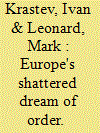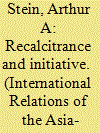|
|
|
Sort Order |
|
|
|
Items / Page
|
|
|
|
|
|
|
| Srl | Item |
| 1 |
ID:
141673


|
|
|
|
|
| Summary/Abstract |
Any discussion of a potential ‘Brexit’ should be set against the backdrop of an increasingly convulsive European landscape. The merits and shortcomings of the European Union should be judged not in isolation, but through the lens of their implications upon a broader postwar European order that Britain has helped to build and sustain for nearly seven decades. US strategic retrenchment, Germany's economic and political pre-eminence within the EU, and Russia's attempts to recreate a sphere of influence in Eastern Europe are likely to disrupt the European balance. Luis Simón argues that ‘Brexit’ could exacerbate each of these disruptive trends – with negative ramifications for UK national security. Conversely, he contends, by leveraging its membership of and influence within the EU, Britain could help revitalise the transatlantic relationship, mitigate the spectre of a German-dominated EU, and check Russian revisionism in Eastern Europe.
|
|
|
|
|
|
|
|
|
|
|
|
|
|
|
|
| 2 |
ID:
137530


|
|
|
|
|
| Summary/Abstract |
Until recently, most Europeans believed that their post–Cold War security order held universal appeal and could be a model for the rest of the world. This conviction was hardly surprising, since Europe has often played a central role in global affairs. For much of the last three centuries, European order was world order—a product of the interests, ambitions, and rivalries of the continent’s empires. And even during the Cold War, when the new superpowers stood on opposite sides of the continent, the central struggle was between two European ideologies, democratic capitalism and communism, and over control of the European lands in between.
|
|
|
|
|
|
|
|
|
|
|
|
|
|
|
|
| 3 |
ID:
131390


|
|
|
|
|
| Publication |
2014.
|
| Summary/Abstract |
This paper challenges the conventional wisdom that US power and preferences following World War II led to bilateralism in Asia and multilateralism in Western Europe. It argues that the challenges facing the United States in both regions were similar, as were US policies meant to address them. With some lag, the United States supported the economic recovery of the regional powers it had defeated (Germany and Japan), saw the restoration of regional trade as a prerequisite, sought military bases to assure postwar security, and envisioned rearming its former foes as part of its security strategy. The outcomes in the two regions reflected the preferences and reservations of regional actors. The critical differences between the regions were structural. The existence of middle powers was critical in Europe, the return of colonial powers to Asia precluded regional arrangements in the short term, and geostrategic differences shaped the requisites for regional security.
|
|
|
|
|
|
|
|
|
|
|
|
|
|
|
|
|
|
|
|
|